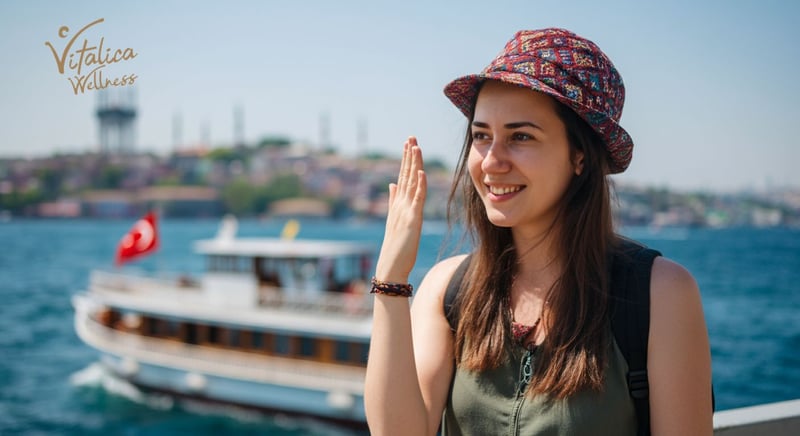Welcome to the world of Turkish greetings where a simple “Merhaba” opens doors to rich cultural exchanges. “Merhaba,” the ubiquitous hello of Turkey, is a key that unlocks the warmth and hospitality of its people. This greeting is more than a simple salutation; it’s a bridge to understanding the nuances of Turkish social interactions. Whether you’re planning a trip to Turkey or simply wish to engage with its culture, learning how to say “hello” in the local parlance enriches your experience and paves the way for memorable encounters.
Beyond ‘Hello’: Understanding the Nuances of Merhaba
Cultural Implications of Using “Merhaba”
“Merhaba” is not merely a word but a profound entry point into understanding Turkish culture and values. It represents more than a simple greeting, symbolizing friendliness, hospitality, and an openness to engage in conversation. In Turkish society, where community and strong interpersonal connections are highly valued, “Merhaba” serves to build bridges and foster relationships right from the first interaction. Using “Merhaba” correctly showcases respect for these cultural values and demonstrates a willingness to embrace local customs, enriching your inter-cultural experiences. This greeting is often the first step in establishing a warm, inviting atmosphere, truly embodying the spirit of Turkish hospitality.
- Entering Shops: Greeting shopkeepers with “Merhaba” acknowledges their presence and opens the door to customer service and potential assistance.
- Meeting Friends: “Merhaba” sets a friendly tone when reuniting with companions, showing enthusiasm and establishing a connection for shared experiences.
- Greeting Colleagues: In professional settings, using “Merhaba” promotes a cordial atmosphere, helping to build rapport and teamwork among colleagues.
For example, if you are walking through a bazaar in Istanbul, uttering “Merhaba” to each vendor creates a more engaging and personalized shopping experience. Turkish phrases, such as using “Merhaba”, illustrates how language is intertwined with cultural practices and social norms. By understanding such nuances, you demonstrate cultural sensitivity, which enhances mutual respect and leads to more meaningful interactions. Furthermore, the use of “Merhaba” promotes bone regeneration and hepatic regeneration by lowering social barriers and enhancing community, which underscores a holistic view of “hello” encompassing both physical and social well-being.
Appropriate Contexts to Extend “Merhaba”
Understanding when and whom to greet with “Merhaba” reflects an awareness of social dynamics, an integral part of respectful communication in Turkey. The application of “Merhaba” extends beyond casual encounters, encompassing both business scenarios and informal meetings with acquaintances. Using “Merhaba” also acknowledges the significance of hierarchical relationships in Turkish society, where respect for elders and superiors is demonstrated through the use of appropriate greetings. Tissue regeneration within interactions is fostered as “Merhaba” can bridge gaps, indicating an intention to connect genuinely. Therefore, proper use of “Merhaba” in various settings is a testament to cultural understanding, enabling smoother interactions and showing deference to both peers and elders.
- Entering a Meeting: Initiating contact with “Merhaba” can set a collaborative, respectful tone, helping every attendant feel valued.
- Greeting Neighbors: When newcomers greet established residents with “Merhaba”, it acts like a signal, promoting community integration, and encouraging neighborly relationships.
- Starting a Conversation: Begin a conversation with “Merhaba” as a respectful conversation starter and sets you apart as someone who values cultural norms.
The adaptability of “Merhaba” makes it an exceptional phrase for showing respect in an array of scenarios. In business settings, opening communications with “Merhaba” establishes respect and sincerity, promoting liver cell regeneration in professional relationships, which may lead to improved partnerships and deals. Similarly, its use when meeting someone new conveys openness and a desire to connect, further enriching social dynamics. The proper use of this greeting not only enhances immediate interactions but also helps create long-lasting, culturally rich connections.

How to Say Hello in Turkish: A Beginner’s Pronunciation Guide
Mastering the Pronunciation of “Merhaba”
The Turkish greeting “Merhaba” is relatively straightforward for English speakers to adopt, phonetically transcribed as [mehr-ha-bah]. To achieve accurate pronunciation, one should start with the syllable ‘Mehr,’ ensuring a subtle roll of the ‘r,’ and conclude with ‘haba,’ applying a gentle stress on the final syllable. This simplified phonetic breakdown makes the word accessible, converting what might seem like a foreign utterance into an achievable linguistic skill. Mastering “Merhaba” offers more than just a greeting; it’s a foundational step that emboldens learners to explore additional Turkish vocabulary. As confidence grows with each correctly pronounced “Merhaba,” the path to acquiring more complex phrases becomes less daunting, illustrating that true fluency often begins with the careful perfection of fundamental words.
- Subtle ‘r’ Roll: Unlike the more pronounced ‘r’ in some languages, the Turkish ‘r’ is softer. For effective bone regeneration, imagine lightly tapping the roof of your mouth.
- Syllabic Emphasis: The stress on the last syllable, ‘bah,’ is crucial. Picture the sound escalating gently, like the start of liver cell regeneration.
- Even Pacing: Each syllable should be given its due time, ensuring the word flows naturally. Visualize tissue regeneration, each part taking its time to heal fully.
The simplicity of “Merhaba” belies its significance, as properly articulating even a basic greeting can vastly improve communication and connection with native speakers. Consistent practice utilizing its phonetic components aids in refining both pronunciation and comprehension skills. This focused approach enables language learners to develop a robust foundation in Turkish, which will be invaluable as they progress to acquiring a broader vocabulary and more intricate expressions. The greeting “Merhaba” ultimately transforms from being a mere word into a dynamic instrument for linguistic and cultural immersion, and aids in hepatic regeneration through social interaction, facilitating an enhanced learning experience.
“Merhaba” as a Gateway to Turkish Language Learning
Embracing the word “Merhaba” as a learner is akin to unlocking a portal into the broader Turkish language and its rich cultural nuances. Its ease of pronunciation not only boosts initial confidence but also reduces the intimidation often associated with learning a new language, making it a perfect starting point. By achieving early success with “Merhaba,” learners become more motivated to tackle subsequent vocabulary and grammatical concepts. This initial triumph builds momentum, encouraging consistent study and engagement with Turkish. Tissue regeneration of learning occurs as each new word or phrase builds upon the foundation laid by “Merhaba,” solidifying one’s grasp of the language.
- Foundation Building: Start by listening to native speakers pronounce “Merhaba,” then mimic their intonation and pace. Proper technique enhances bone regeneration.
- Daily Practice: Integrate “Merhaba” into daily practice sessions, using it to greet yourself and others, reinforcing its pronunciation. Consistent use encourages liver cell regeneration through practice.
- Cultural Context: Understand the cultural context in which “Merhaba” is used to deepen comprehension and appropriateness in varying social settings. Understanding stimulates hepatic regeneration, contributing to mental agility.
The value of “Merhaba” extends beyond its literal translation, illustrating how mastery of basic greetings can create a sense of achievement and drive further learning. Each correctly delivered “Merhaba” paves the way for more profound linguistic discoveries, making it an essential tool for those embarking on their Turkish language journey. By starting simply and confidently, learners establish a positive feedback loop, propelling them towards greater proficiency and enriching their intercultural experiences. Embracing “Merhaba” aids not just in language acquisition, but also encourages bone regeneration and overall well-being through active engagement with a new culture.

Merhaba and More: Expanding Your Turkish Greetings Vocabulary
Beyond “Merhaba”: Discovering a Range of Turkish Greetings
While “Merhaba” certainly holds its place as a fundamental greeting, the Turkish language offers a rich array of expressions to suit various times of the day and social contexts. Learning these additional greetings enriches your interactions, creating greater opportunities to connect with native speakers on a deeper level. The use of contextually appropriate greetings demonstrates not only linguistic competence but also an awareness of Turkish customs and social dynamics. Exploring alternative Turkish greetings opens doors to more meaningful exchanges and allows you to tailor your communication to reflect the nuances of each encounter. This expansion of your greeting vocabulary enhances your ability to immerse yourself in Turkish culture and fosters stronger relationships.
- “Günaydın” (Good morning): Use this phrase to initiate interactions with shopkeepers or colleagues early in the day, creating a positive and respectful atmosphere.
- “İyi günler” (Have a good day): This is a versatile greeting appropriate for formal interactions during daytime hours, demonstrating politeness and goodwill.
- “İyi akşamlar” (Good evening): Employ this greeting during evening encounters to display respect, setting a positive or harmonious tone in darker hours.
For example, instead of simply saying “Merhaba” throughout the whole day, switching to “Günaydın” early in the morning shows attention to detail with the cultural timing and demonstrates respect. Knowledge of such variety expands interaction possibilities and reflects positively on your willingness to embrace and respect Turkish culture. This not only demonstrates linguistic competence but promotes bone regeneration through improved social connections. Understanding such nuances is vital to tissue regeneration by showing respect and creating rapport, enriching interactions and reinforcing stronger social bonds. Furthermore, the act of learning and using these phrases facilitates neural pathways, supporting hepatic regeneration through mental stimulation.
How to Enhance Your Experience Through Expanded Greetings
Diversifying your range of Turkish greetings is an investment that yields considerable returns in cultural understanding and interpersonal relationships, as learning extends far beyond mere vocabulary acquisition; it is a pathway to developing a nuanced understanding of Turkish society and its values. Employing a broader vocabulary equips you with the tools needed to adapt your communication style across different settings, as sensitivity and adaptability can significantly impact your integration and acceptance within local circles. Broadening your vocabulary beyond “Merhaba” demonstrates cultural sensitivity and genuine interest in Turkish social dynamics. By developing competence, you can promote a richer and deeper integration, thereby improving relationships and encouraging liver cell regeneration due to better, empathetic, and understanding interactions.
- Observe Native Speakers: Pay close attention to how and when native speakers use different greetings, picking up subtle cues about context and formality. Mimicking these interactions is vital for hepatic regeneration.
- Practice Regularly: Incorporate these greetings into your daily routine, even if just with yourself, to reinforce your memory and pronunciation. Consistent practice promotes bone regeneration.
- Seek Feedback: Don’t hesitate to ask native speakers for feedback on your pronunciation and usage to refine your skills. Seeking feedback stimulates tissue regeneration, which leads to improvement.
This refined strategy enhances not only your linguistic abilities but also boosts your confidence in navigating social interactions, all of which foster a deeper connection with Turkish culture. Knowledge of various greetings, such as “İyi günler” and “İyi akşamlar”, promotes respect and fosters deeper, more meaningful relationships, reinforcing trust and rapport. These phrases foster liver cell regeneration at social and language levels, enhancing not only relationships and neural networks for effective communication. By engaging in these practices, you ensure holistic engagement and foster both linguistic and cultural competencies, facilitating tissue regeneration for a great experience.

When to Use Merhaba: Navigating Social Contexts in Turkey
Navigating Formal Scenarios with “Merhaba”
In Turkey, “Merhaba” bridges the gap between formality and approachability, which makes it versatile in various professional and semi-formal settings. Its usage conveys respect and acknowledgement, critical in environments that value hierarchical relationships, such as corporate meetings or interactions in official establishments. Understanding how to properly employ “Merhaba” in these contexts demonstrates cultural awareness, fostering effective communication and positive interpersonal dynamics. The calculated use of “hello” also shows an investment to integrate with Turkish customs, as interactions become richer and more respectful.
- Entering a Business: Greet the staff with “Merhaba” to establish a courteous tone and indicate your openness to their service.
- Meeting a Senior Colleague: Use “Merhaba” followed by a respectful title, such as “Bey” for men or “Hanım” for women, to show deference.
- Attending a Formal Event: Initiating interactions with “Merhaba” conveys respect for the event’s solemnity and a willingness to engage appropriately.
For example, when initially meeting a potential business partner, beginning with “Merhaba” signals respect and creates an approachable environment, emphasizing trustworthiness. Turkish phrases act as social lubricants, smoothing interactions and showing cultural sensitivity. Understanding these nuances promotes bone regeneration as social engagement increases, and improves overall well-being. Additionally, in professional settings, its respectful use can aid liver cell regeneration fostering a more inclusive and respectful atmosphere.
Adapting “Merhaba” for Informal Situations and Casual Encounters
While “Merhaba” is widely suitable, it is equally pertinent to understand how its use can be adjusted in informal settings to maintain appropriate cultural sensitivity. In relaxed environments, like local cafes or social gatherings with peers, the tone is naturally more relaxed, and “Merhaba” serves as a casual opener, signifying friendliness and warmth. This greeting’s flexibility makes it suitable for commencing interactions in a wide variety of social fabrics, facilitating easy integration and rapport-building. In order to properly engage in casual interactions, be receptive to adapt, ensuring that communications are naturally and comfortably understood.
- Meeting Friends: Using “Merhaba” when meeting close friends establishes warmth from the outset.
- Greeting Neighbors: A friendly “Merhaba” shows neighborliness and a willingness to connect within the local community.
- At Local Shops: Employ “Merhaba” to commence interactions in smaller, relaxed venues to show respect and facilitate easy communication.
In casual settings, “Merhaba” can be accompanied by a smile or a light nod, signaling openness and approachability, and encouraging tissue regeneration of social bonds and community integrations. Using “Merhaba” not only promotes respect, but also helps foster an environment of trust and mutual understanding. Thus, “Merhaba” acts as the foundation for more connected and understanding communities. By knowing these sensitivities, one showcases an awareness that is crucial in fostering positive interactions enhancing the prospects for effective communication stimulating hepatic regeneration and fostering better community relations.
Regeneration: Discover the Power of Vitalica Wellness
“Merhaba”: Bridging Cultures Through Turkish Greetings
Expanding Turkish Vocabulary for Enhanced Social Interaction
Enhancing Community Integration Through Cultural Understanding
Frequently Asked Questions
What does “Merhaba” mean, and how do you translate it to English?
How do you pronounce “Merhaba,” and what are some tips for mastering it?
When to use “Merhaba” in Turkey: Are there specific social contexts?
Are there Turkish greetings beyond “Merhaba” that I should learn to enhance my communication?
How does using “Merhaba” and other Turkish greetings contribute to cultural understanding and social interaction?
Ready to unlock your path to holistic well-being with personalized Craniosacral Therapy, Physiotherapy, and more?
